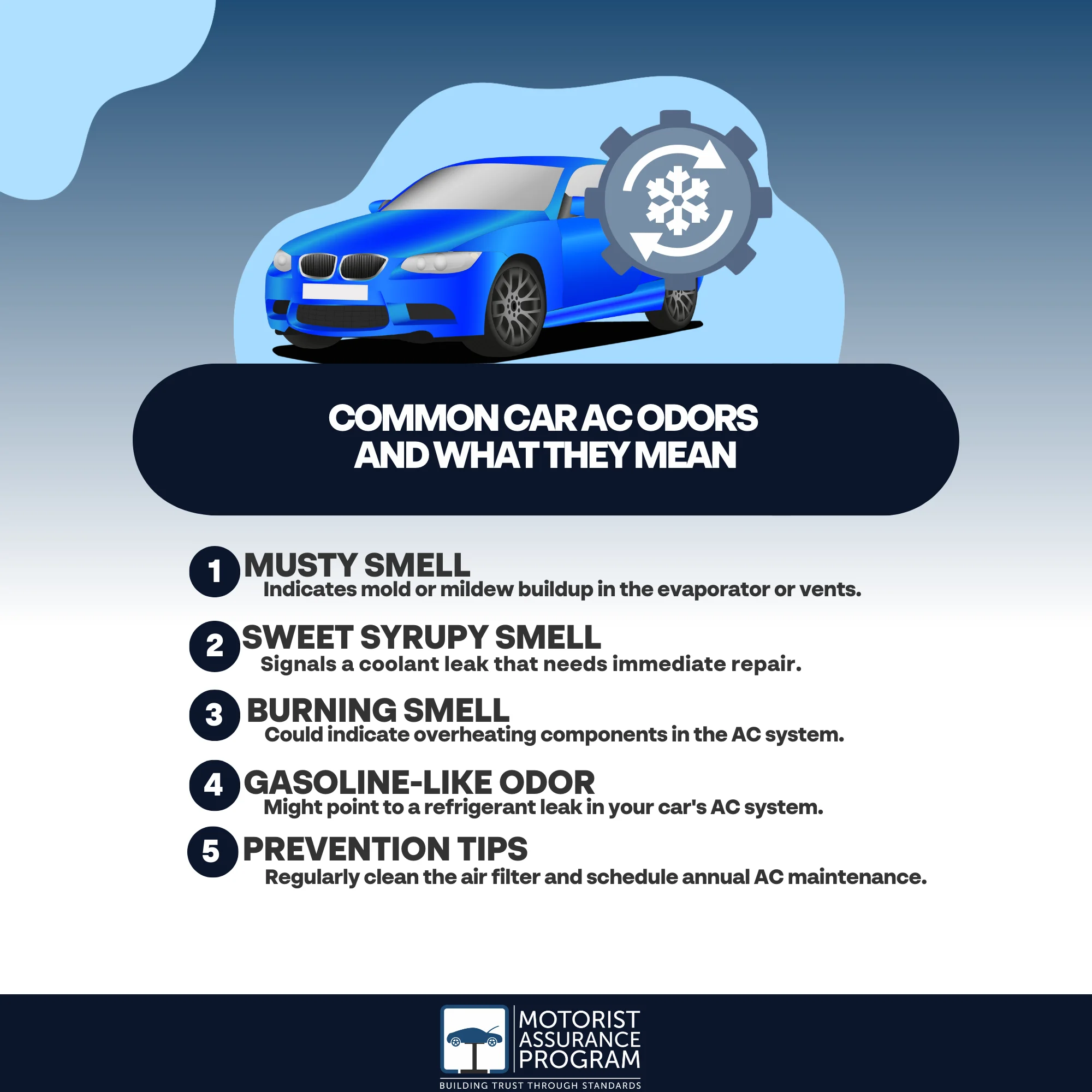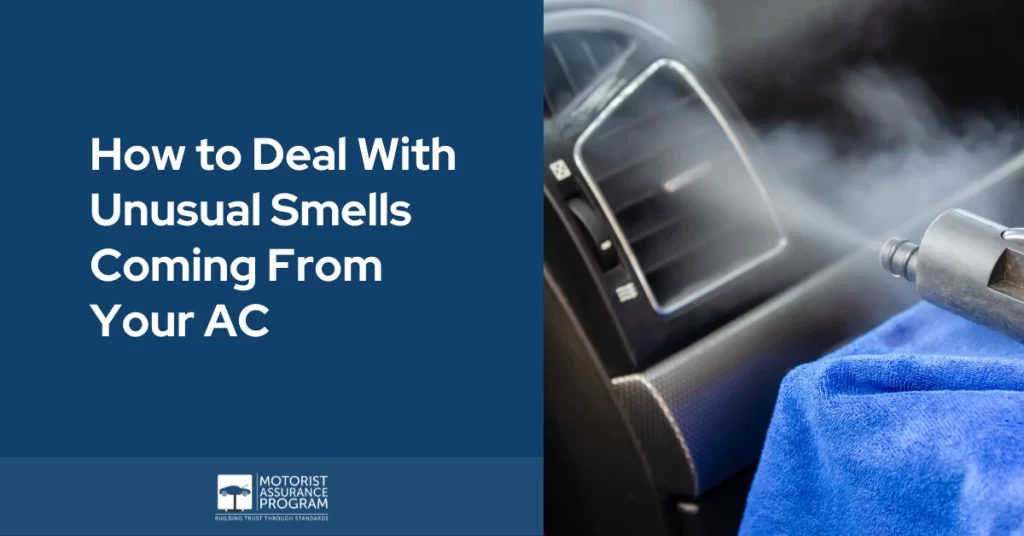Your AC is belching out smells so foul, it’s like a skunk took up residence in your vents. You’re not just dealing with a minor inconvenience – these odors could signal serious problems. Maybe it’s a musty smell hinting at mold growth or a sweet scent revealing a coolant leak. And then there’s the dreaded burning smell that’s a screaming plea for immediate professional help. Understanding these warning signals is essential to maintaining a safe and comfortable environment. Want to learn more about what your AC is trying to tell you? Stick around, the answer may surprise you.

Key Takeaways
- Identify the specific smell to determine potential problems with your AC system, such as coolant leaks or mold growth.
- Regularly replace or clean the cabin air filter to prevent buildup of dirt and bacteria causing foul odors.
- If a sweet, syrupy smell is detected, check for coolant leaks and get them promptly repaired.
- For musty odors, inspect the evaporator for mold or mildew, and consider professional cleaning if needed.
- For burnt or gasoline-like smells, consult a professional to inspect for overheating components or refrigerant leaks.
How Air Conditioning Works
Nearly every modern vehicle comes equipped with an air conditioning system, designed to keep you comfortable even on the hottest days.
But how does it work? It’s a complex process, but it’s not magic. It’s science.
Your car’s AC system consists of a compressor, a condenser, an expansion valve, and an evaporator. The cycle begins when the compressor pressurizes the refrigerant, heating it up.
The high-pressure, high-temperature refrigerant then flows into the condenser, where it’s cooled and turned into a liquid.
Next, the liquid refrigerant moves into the expansion valve. Here, the pressure drops and the refrigerant becomes a low-temperature, low-pressure gas.
This gas enters the evaporator, where it absorbs heat from the cabin’s air and cools it down. The fan then blows this cooled air into your car.
The refrigerant, now a warm gas, returns to the compressor, and the cycle starts again.
It’s a continuous process, maintaining a cool temperature inside your car. Understanding this can give you a better grasp of what might be going wrong if your AC isn’t working properly.
Car Air Conditioning Smells
Despite the comfort it provides, your car’s air conditioning system can sometimes emit unusual smells that could indicate a problem.
These smells may vary, and each one can point to a different issue within your AC system. A sweet, syrupy smell could mean a coolant leak, while a musty odor often suggests mold growth in your AC’s evaporator. A burnt smell, on the other hand, might signal an overheating motor or a worn-out clutch. If your car’s AC starts to smell like gasoline, it’s possible that there’s a refrigerant leak.
Remember, these smells aren’t just unpleasant – they’re often signs of deeper issues that could affect the performance of your car’s AC system, or even your vehicle as a whole. Consequently, it’s important to not ignore these odors.
If you notice any strange smells coming from your car’s air conditioning, you should get it checked out by a professional as soon as possible.
They’ll be able to diagnose the problem and recommend the appropriate repairs or maintenance to guarantee your AC system continues to function properly.
Causes of Car Air Conditioning Smells
Understanding the causes of unusual smells from your car’s air conditioning system is vital in maintaining its ideal performance.
One common cause is the growth of mold and mildew within your AC system’s evaporator. This happens when moisture trapped in the system doesn’t evaporate properly, creating a perfect environment for these organisms.
Another possible culprit is a clogged or dirty cabin air filter. This filter purifies the air entering your car. If it’s clogged or dirty, it might produce a foul smell.
Similarly, a leak in your AC system could lead to a refrigerant or coolant smell, which can be quite pungent and unpleasant.
Lastly, a burning smell might indicate a more serious issue. This could be due to an overheating component within your AC system, such as the compressor.
It’s important to get this checked out immediately as it could lead to further damage.
Signs your air conditioning isn’t working properly
Cranking up your car’s air conditioning only to find it’s not cooling your vehicle can be a clear sign that it’s not working properly. An AC that isn’t providing cool air is one of the most noticeable signs it’s malfunctioning, but there are others.
If you’re hearing strange noises like squealing or grinding when you switch the AC on, that’s a red flag. It could mean there’s an issue with the compressor, fan, or the drive belt.
Additionally, noticing a musty smell coming from the vents when the AC is running is another telltale sign. This might indicate mold or mildew buildup in the system due to moisture.
A sudden increase in your vehicle’s fuel consumption can also indicate a problem. The AC system uses engine power; if it’s faulty, it may need more power, consequently increasing fuel usage.
Finally, if you notice water inside your car, particularly under the dashboard, the AC’s drain tube might be blocked.
These signs show that your AC isn’t functioning as it should. Always consult a professional immediately when you notice them.
How to make your air-conditioning last longer
Maintaining your car’s air conditioning not only guarantees cool comfort during hot weather, but it also extends the lifespan of the system. This requires regular check-ups and preventative maintenance.
Don’t wait until you notice a foul smell or lack of cool air. Instead, get your AC serviced annually to affirm its efficient operation.
The most crucial step in AC maintenance is keeping the refrigerant and oil at appropriate levels. Low refrigerant levels can damage your compressor, leading to costly repairs or replacements.
Regularly check for any leaks and get them repaired promptly. Your system’s oil is important in lubricating its components and reducing friction. Without it, parts can wear out faster.
Cleaning and replacing your AC filters are also essential. A clogged filter restricts airflow, forcing your system to work harder and reducing its efficiency.
Replace or clean your filters every six months for peak performance.
Frequently Asked Questions
What Health Risks Are Associated With Unusual Smells From Car AC Systems?
Unusual smells from your car’s AC can pose health risks. They may indicate mold or bacteria build-up, potentially causing respiratory issues, allergies, or headaches. It’s essential you get it checked to guarantee your safety.
Are Certain Car Models More Prone to AC Odors Than Others?
Your car’s make doesn’t initiate AC smells. It’s mostly about upkeep. Neglected filters or moisture buildup can cause odors. Regular maintenance can prevent this. So, it’s not about the car, it’s about care.
Can Consistent Bad Smells Indicate a More Serious Vehicle Issue?
Yes, consistent bad smells can indicate serious vehicle issues. They’re often a sign of mold or bacteria buildup in the AC system. Don’t ignore them; get your car checked by a professional to avoid further problems.
How Often Should I Schedule Professional AC Maintenance Checks?
You should schedule professional AC maintenance checks annually. Regular checks guarantee your system’s running efficiently, can catch potential issues early, and help prevent unexpected breakdowns. It’s a proactive step in maintaining your vehicle’s overall health.
Does Running the AC Less Frequently Prevent the Development of Odors?
Running your AC less frequently won’t necessarily prevent odors. It’s important to maintain your system properly. Dirt and moisture can build up, causing smells. Regular cleaning and maintenance can help keep your AC odor-free.
Conclusion
Don’t let a strange odor from your AC keep you guessing. Is it a sweet scent hinting at a coolant leak, or a musty whiff of mold growth? Maybe it’s the alarming aroma of overheating? Don’t play the guessing game. Act swiftly, inspect, replace, or seek professional help. Remember, regular maintenance is your best defense. Keep your senses alert – your car’s AC could be whispering an urgent secret. Be ready to listen and act.


